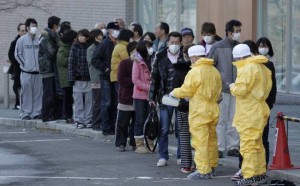Radiation exposure in Japan
The threat of radiation exposure was heightened Tuesday following an explosion and fire at the Fukushima Daiichi nuclear plant which later prompted officials to warn people in a 30-kilometer (19-mile) radius to stay indoors.
“Please do not go outside. Please stay indoors. Please close windows and make your homes airtight. Don’t turn on ventilators. Please hang your laundry indoors” – Chief Cabinet Secretary Edano said to the residents in the danger zone. “These are figures that potentially affect health. There is no mistake about that.”
According to the Associated Press, about 140.000 people were impacted by the warning.
Hours after the explosion and fire, elevated levels of radiation were detected in Tokyo (175 miles away) though government officials said there was no health risk there, according to the Associated Press.
The explosion, which occurred at 6:10 a.m. local time Tuesday came shortly after the International Atomic Energy Agency announced that the reactors at the Fukushima Daiichi plant were shut down.
While the previous explosions at Fukushima Daiichi reactors Nos. 1 and 3 were hydrogen blasts caused by a buildup of steam in the reactor units, the new blast at reactor No. 2 has officials very concerned.
This time, the roof did not blow off and it’s now believed the trapped pressure cracked the containment vessel around the reactor’s core, allowing radio active material to seep out.

- Radiation exposure.
Radiation experts say it is difficult to know the severity of the situation in Japan – as explosions at the country’s Fukushima nuclear plant lead to rising levels of radiation around the facility.
Japan’s prime minister Naoto Kan has warned radiation levels near the plant, about 250 kilometres north-east of Tokyo, are now harmful to human health.
People living nearby, still reeling from Friday’s devastating earthquake and tsunami, have either been evacuated or told to stay in their homes.
Radiation experts say staying indoors is the best way to limit exposure. And that it is useless to wear a face mask.
The International Atomic Energy Agency (IAEA) says radiation levels around the plant are now 400 millisieverts an hour, eight times the amount, every 60 minutes, that nuclear workers are normally supposed to absorb in a year.
Ira Helfand (a medical doctor based in Washington DC who has written extensively on the impacts of radiation) says someone exposed to this level of radiation for a couple of hours would develop radiation sickness.
“This is a very, very large increase from the radiation readings that were recorded just a few hours before the most recent explosion” – he said.
http://www.youtube.com/watch?v=H36oKJ3XWdg
As radiation levels rise at the crippled reactors in northern Japan, a basic question arises – how long can workers keep struggling to ward off full meltdowns?
The workers are performing what have been described as heroic tasks, like using fire equipment to pump seawater into the three failing reactors to keep the nuclear fuel from melting down and fighting the fire at a fourth reactor.
They are operating in places that have been contaminated by radioactive isotopes from all four reactors. Technicians who have not been evacuated face an escalating exposure. And will have to be replaced if the fight is to go on.
“If they exceed a certain amount, they can’t go back in for a day or a week or longer” – said Dr. Lew Pepper, a professor at the Boston University School of Public Health who has studied the effects of radiation on nuclear weapons workers. And the pool of available replacements is finite, he said: “What do you do? You don’t have a lot of people who can do this work.”
The nuclear plants’ operator, Tokyo Electric Power, has declined to provide details about the workers.
But Arnold Gundersen (a consultant who worked in American plants nearly identical to the stricken Japanese ones) said it was likely that the company was calling in retirees and workers from unaffected plants for help. And perhaps for sacrifice, as well. “They may also be asking for people to volunteer to receive additional exposure” – he said.